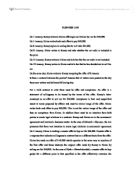X owns a holiday cottage in a remote mountain area. In May he agreed to let it to Y from 1-15 August. Y paid a deposit of £ 200. On the afternoon of 31 July, after Y and his family had set off from their home near London, a landslide rendered the cottage uninhabitable. X, who had recently spent £ 500 on redecoration in preparation for Y's visit, was unable to contact Y, and Y only found out what had happened when he arrived at the cottage. Y spent £ 200 on hotel accommodation for the night before returning home next day. Y and his family were very disappointed at not having the holiday they had planned.
Y is now demanding that X should return his deposit and pay him compensation.
Advise X. What difference, if any, would it make if the damage to the cottage had been caused by a fire carelessly started by X?
SUGGESTED ANSWER :
In advising X, it has to be determine whether the contract between Y and X has been frustrated, and if so can Y demand for his deposit and further compensation.
Frustration occurs when without default of either party to the contract, the contractual obligation has became incapable of being performed Amalgamated Investment v John Walker.
There are 2 test for frustration. By the Implied Term Theory test there is an implied term in every contract that if the contract is incapable of being performed without default of either party the contract is discharge Blackburn J in Taylor v Caldwell
Y is now demanding that X should return his deposit and pay him compensation.
Advise X. What difference, if any, would it make if the damage to the cottage had been caused by a fire carelessly started by X?
SUGGESTED ANSWER :
In advising X, it has to be determine whether the contract between Y and X has been frustrated, and if so can Y demand for his deposit and further compensation.
Frustration occurs when without default of either party to the contract, the contractual obligation has became incapable of being performed Amalgamated Investment v John Walker.
There are 2 test for frustration. By the Implied Term Theory test there is an implied term in every contract that if the contract is incapable of being performed without default of either party the contract is discharge Blackburn J in Taylor v Caldwell







